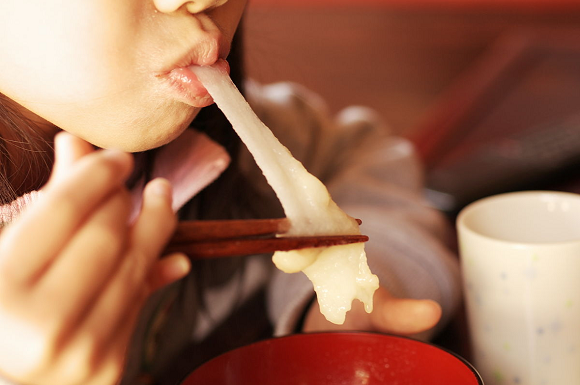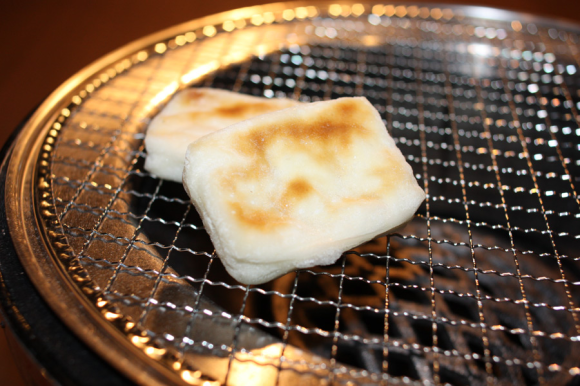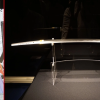
Often considered a symbol of longevity, mochi annually brings about sudden deaths.
My wife and I went to her parents’ house for dinner on January 1, and included in the spread were a number of osechi (celebratory New Year’s) dishes. If you’ve got a dual passion for the Japanese language and linguistics, osechi is a real treat, since names of the dishes all have some sort of cultural or linguistic significance. For example, renkon (lotus roots) are an osechi staple because they have holes in their cross-section, so that you saki ga mieru/“can see ahead,” implying that eating them will give you a clear vision of an auspicious future.
But osechi has a dark twist in the form of mochi (rice cakes). Outside Japan, mochi is most commonly encountered as mochi daifuku, a bite-sized dessert that’s actually a thin mochi covering with some sort of sweet filling. But when mochi is eaten as a solid block, like it is for osechu, its texture is incredibly stretchy. The Japanese word for “stretch,” nobiru, can also mean “extend” or “continue,” and so eating osechi at New Year’s is said to extend your longevity, giving you a long and happy life. Ironically, though, mochi is the only osechi dish that consistently racks up a body count.
Mochi is so stretchy that it can be hard to bite through, especially for senior citizens whose teeth aren’t in the best shape to begin with. That leads to people trying to swallow their mochi in bigger pieces than they would for other foods, and every year, a number of elderly Japanese choke on their New Year’s mochi. This year, the Tokyo Fire Department reported that by 9 p.m. on January 1, 15 Tokyo residents were taken to the hospital for emergency medical treatment as they gagged on mochi. Their ages ranged between 55 and 90, and two men, one in his 50s and the other in his 80s, perished when the mochi could not be dislodged in time.
In Japan, the New Year’s festivities traditionally continue through the 3rd of January, which means that there’s still a lot of osechi, and thus more mochi, to be eaten. The fire department encourages seniors to cut their mochi into small pieces, chew thoroughly, and swallow carefully. The department also implores fellow diners to be attentive of elderly relatives and acquaintances and to offer assistance and contact the paramedics if they are having difficulty swallowing.
Sources: Sankei News via Jin, Ryugo News Sokuho Tsuhin Kyoku
Top image: Wikipedia/Opponent
Insert image: Gahag


 Japan’s most dangerous New Year’s food causes death once again in Tokyo
Japan’s most dangerous New Year’s food causes death once again in Tokyo Mochi, the silent New Year killer, leaves nine dead and 128 hospitalized
Mochi, the silent New Year killer, leaves nine dead and 128 hospitalized Japan’ deadliest New Year’s food may be even more dangerous in 2021 due to the coronavirus
Japan’ deadliest New Year’s food may be even more dangerous in 2021 due to the coronavirus Survey says osechi New Year’s food differs according to each region in Japan
Survey says osechi New Year’s food differs according to each region in Japan Celebrate New Years in Pokémon style — with a monster ball filled with traditional osechi food!
Celebrate New Years in Pokémon style — with a monster ball filled with traditional osechi food! Foreigner’s request for help in Tokyo makes us sad for the state of society
Foreigner’s request for help in Tokyo makes us sad for the state of society Japanese city loses residents’ personal data, which was on paper being transported on a windy day
Japanese city loses residents’ personal data, which was on paper being transported on a windy day Harajuku Station’s beautiful old wooden building is set to return, with a new complex around it
Harajuku Station’s beautiful old wooden building is set to return, with a new complex around it Red light district sushi restaurant in Tokyo shows us just how wrong we were about it
Red light district sushi restaurant in Tokyo shows us just how wrong we were about it Ghibli Park now selling “Grilled Frogs” from food cart in Valley of Witches
Ghibli Park now selling “Grilled Frogs” from food cart in Valley of Witches Akihabara pop-up shop sells goods made by Japanese prison inmates
Akihabara pop-up shop sells goods made by Japanese prison inmates Tokyo Tsukiji fish market site to be redeveloped with 50,000-seat stadium, hotel, shopping center
Tokyo Tsukiji fish market site to be redeveloped with 50,000-seat stadium, hotel, shopping center Beautiful Red and Blue Star luxury trains set to be Japan’s new Hokkaido travel stars
Beautiful Red and Blue Star luxury trains set to be Japan’s new Hokkaido travel stars Haku is…Chihiro’s dead brother? Studio Ghibli fans blown away by Spirited Away theory
Haku is…Chihiro’s dead brother? Studio Ghibli fans blown away by Spirited Away theory Real-life Rurouni Kenshin reverse-blade katana, forged by master swordsmith, now on display【Pics】
Real-life Rurouni Kenshin reverse-blade katana, forged by master swordsmith, now on display【Pics】 McDonald’s new Happy Meals offer up cute and practical Sanrio lifestyle goods
McDonald’s new Happy Meals offer up cute and practical Sanrio lifestyle goods Japanese ramen restaurants under pressure from new yen banknotes
Japanese ramen restaurants under pressure from new yen banknotes French Fries Bread in Tokyo’s Shibuya becomes a hit on social media
French Fries Bread in Tokyo’s Shibuya becomes a hit on social media Studio Ghibli releases new action figures featuring Nausicaä of the Valley of the Wind characters
Studio Ghibli releases new action figures featuring Nausicaä of the Valley of the Wind characters New private rooms on Tokaido Shinkansen change the way we travel from Tokyo to Kyoto
New private rooms on Tokaido Shinkansen change the way we travel from Tokyo to Kyoto All-you-can-drink Starbucks and amazing views part of Tokyo’s new 170 meter-high sky lounge
All-you-can-drink Starbucks and amazing views part of Tokyo’s new 170 meter-high sky lounge Beautiful Ghibli sealing wax kits let you create accessories and elegant letter decorations【Pics】
Beautiful Ghibli sealing wax kits let you create accessories and elegant letter decorations【Pics】 Studio Ghibli releases Kiki’s Delivery Service chocolate cake pouches in Japan
Studio Ghibli releases Kiki’s Delivery Service chocolate cake pouches in Japan New definition of “Japanese whiskey” goes into effect to prevent fakes from fooling overseas buyers
New definition of “Japanese whiskey” goes into effect to prevent fakes from fooling overseas buyers Our Japanese reporter visits Costco in the U.S., finds super American and very Japanese things
Our Japanese reporter visits Costco in the U.S., finds super American and very Japanese things Studio Ghibli unveils Mother’s Day gift set that captures the love in My Neighbour Totoro
Studio Ghibli unveils Mother’s Day gift set that captures the love in My Neighbour Totoro More foreign tourists than ever before in history visited Japan last month
More foreign tourists than ever before in history visited Japan last month New Pokémon cakes let you eat your way through Pikachu and all the Eevee evolutions
New Pokémon cakes let you eat your way through Pikachu and all the Eevee evolutions Sales of Japan’s most convenient train ticket/shopping payment cards suspended indefinitely
Sales of Japan’s most convenient train ticket/shopping payment cards suspended indefinitely Sold-out Studio Ghibli desktop humidifiers are back so Totoro can help you through the dry season
Sold-out Studio Ghibli desktop humidifiers are back so Totoro can help you through the dry season Japanese government to make first change to romanization spelling rules since the 1950s
Japanese government to make first change to romanization spelling rules since the 1950s Ghibli founders Toshio Suzuki and Hayao Miyazaki contribute to Japanese whisky Totoro label design
Ghibli founders Toshio Suzuki and Hayao Miyazaki contribute to Japanese whisky Totoro label design Doraemon found buried at sea as scene from 1993 anime becomes real life【Photos】
Doraemon found buried at sea as scene from 1993 anime becomes real life【Photos】 Tokyo’s most famous Starbucks is closed
Tokyo’s most famous Starbucks is closed One Piece characters’ nationalities revealed, but fans have mixed opinions
One Piece characters’ nationalities revealed, but fans have mixed opinions We asked a Uniqlo employee what four things we should buy and their suggestions didn’t disappoint
We asked a Uniqlo employee what four things we should buy and their suggestions didn’t disappoint Princesses, fruits, and blacksmiths: Study reveals the 30 most unusual family names in Japan
Princesses, fruits, and blacksmiths: Study reveals the 30 most unusual family names in Japan Seaweed in your green tea Frappuccino? Starbucks Japan has a bold idea for its New Year’s drink
Seaweed in your green tea Frappuccino? Starbucks Japan has a bold idea for its New Year’s drink Starbucks Japanese New Year’s Frappuccino: Too delicious to wait for January to drink【Taste test】
Starbucks Japanese New Year’s Frappuccino: Too delicious to wait for January to drink【Taste test】 Get a taste of the Mushroom Kingdom this New Year with a Super Mario Bros. themed bento box
Get a taste of the Mushroom Kingdom this New Year with a Super Mario Bros. themed bento box You can enjoy traditional Japanese New Year’s osechi eats on a budget with Lawson Store 100
You can enjoy traditional Japanese New Year’s osechi eats on a budget with Lawson Store 100 Awesome Pokémon osechi New Year’s meals elegantly blend Japan’s traditional and pop culture
Awesome Pokémon osechi New Year’s meals elegantly blend Japan’s traditional and pop culture Six non-traditional osechi New Year’s meals in Japan
Six non-traditional osechi New Year’s meals in Japan The pets of Japan wish you a happy new year (some are happier about it than others)【Photos】
The pets of Japan wish you a happy new year (some are happier about it than others)【Photos】 Proceeds from gourmet New Year’s meals to be donated to help feed undernourished children
Proceeds from gourmet New Year’s meals to be donated to help feed undernourished children Lucky Japanese new year ice cream! Baskin-Robbins’ flavor inspired by traditional osechi cuisine
Lucky Japanese new year ice cream! Baskin-Robbins’ flavor inspired by traditional osechi cuisine Celebrate the New Year with a special and limited edition Barbie bento box of New Year foods
Celebrate the New Year with a special and limited edition Barbie bento box of New Year foods Ginza Cozy Corner unveils cute range of osechi New Year cakes featuring lucky Japanese symbols
Ginza Cozy Corner unveils cute range of osechi New Year cakes featuring lucky Japanese symbols Turns out that mochi can be made more delicious by smothering it in creamy carbonara sauce
Turns out that mochi can be made more delicious by smothering it in creamy carbonara sauce Japan turns the confectionery world on its head with stretchy mochi-covered chocolates
Japan turns the confectionery world on its head with stretchy mochi-covered chocolates Hida City’s tempura mochi proves that almost anything tastes better as tempura 【SoraKitchen】
Hida City’s tempura mochi proves that almost anything tastes better as tempura 【SoraKitchen】 Häagen-Dazs’ triple cherry blossom mochi ice cream promises Japan an early taste of spring
Häagen-Dazs’ triple cherry blossom mochi ice cream promises Japan an early taste of spring Trying out First Kitchen’s tsukimi mochi burgers for a taste of Japanese autumn
Trying out First Kitchen’s tsukimi mochi burgers for a taste of Japanese autumn
Leave a Reply